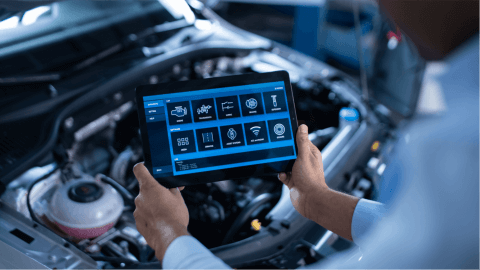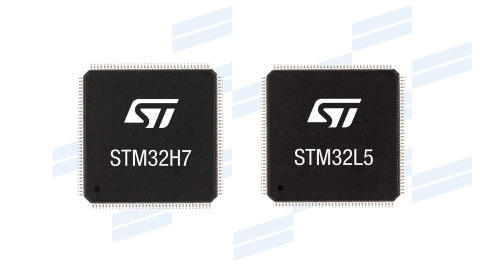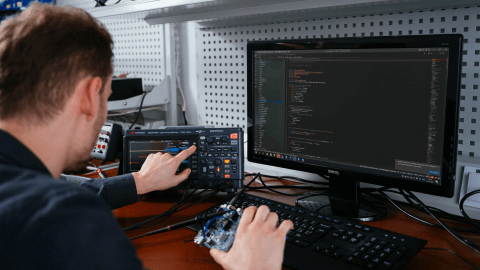Enterprise IoT is another direction of IoT industry development, which businesses are actively adopting. Embedded technologies for large organizations bring new challenges in terms of connectivity, network stability, and data security. Yet, performance increase and cost-efficiency they ensure are worth overcoming the challenges. That's why more and more firms leverage enterprise IoT technologies to automate demanding operations, ensure safe workplaces, and boost productivity.
In this article, we cover the benefits of enterprise IoT for businesses, its applications, market trends, and challenges. Find out how you can leverage this technology to make your company thrive.
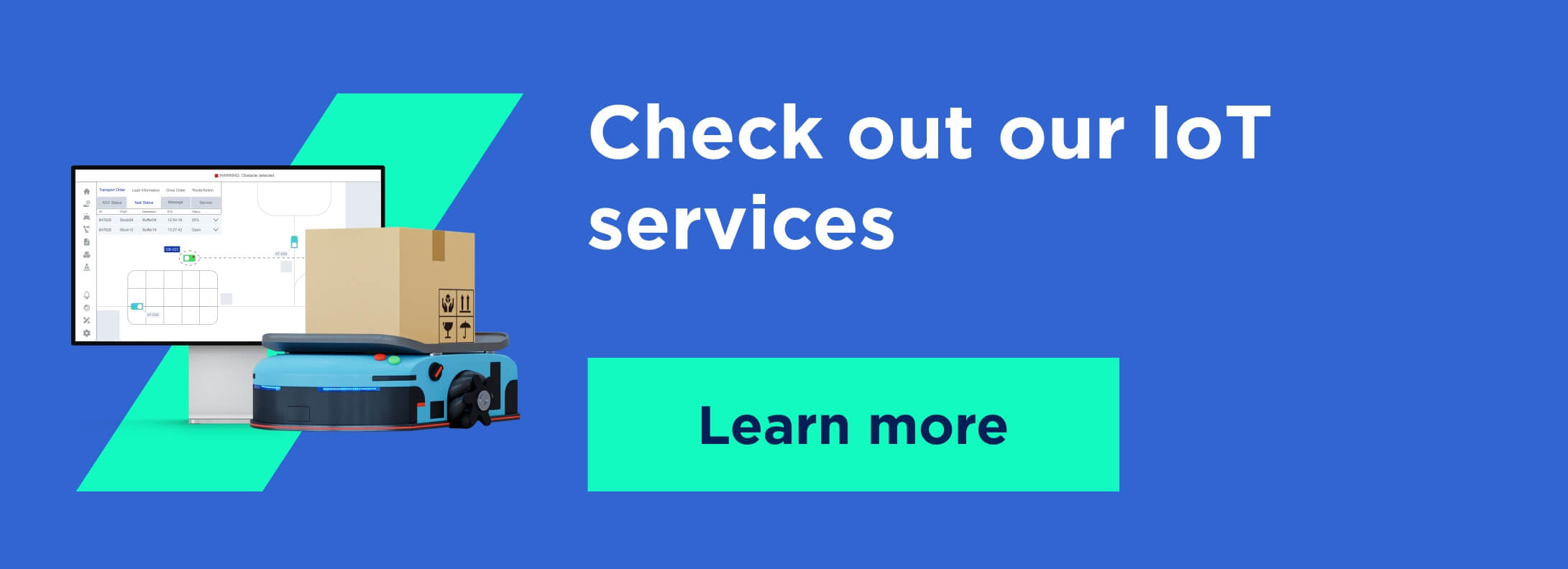
What is enterprise IoT?
Enterprise Internet of Things revolves around integrating connectivity into large organization environments to improve business performance. Enterprise IoT focuses on connecting business management software with hardware to boost intelligent decision-making. It also involves data exchange to enable remote operations. Enterprise IoT allows businesses to automate different tasks that require manual work and increase company productivity.
Enterprise IoT market overview: what's happening?
In 2022, investments in enterprise Internet of Things amounted to $201 billion compared to less than $100 billion in 2018. By 2027, the market is predicted to grow by another 19% annually and reach $483 billion of investments.
Even though 2023 is a year of slower enterprise IoT growth, the market will keep growing.
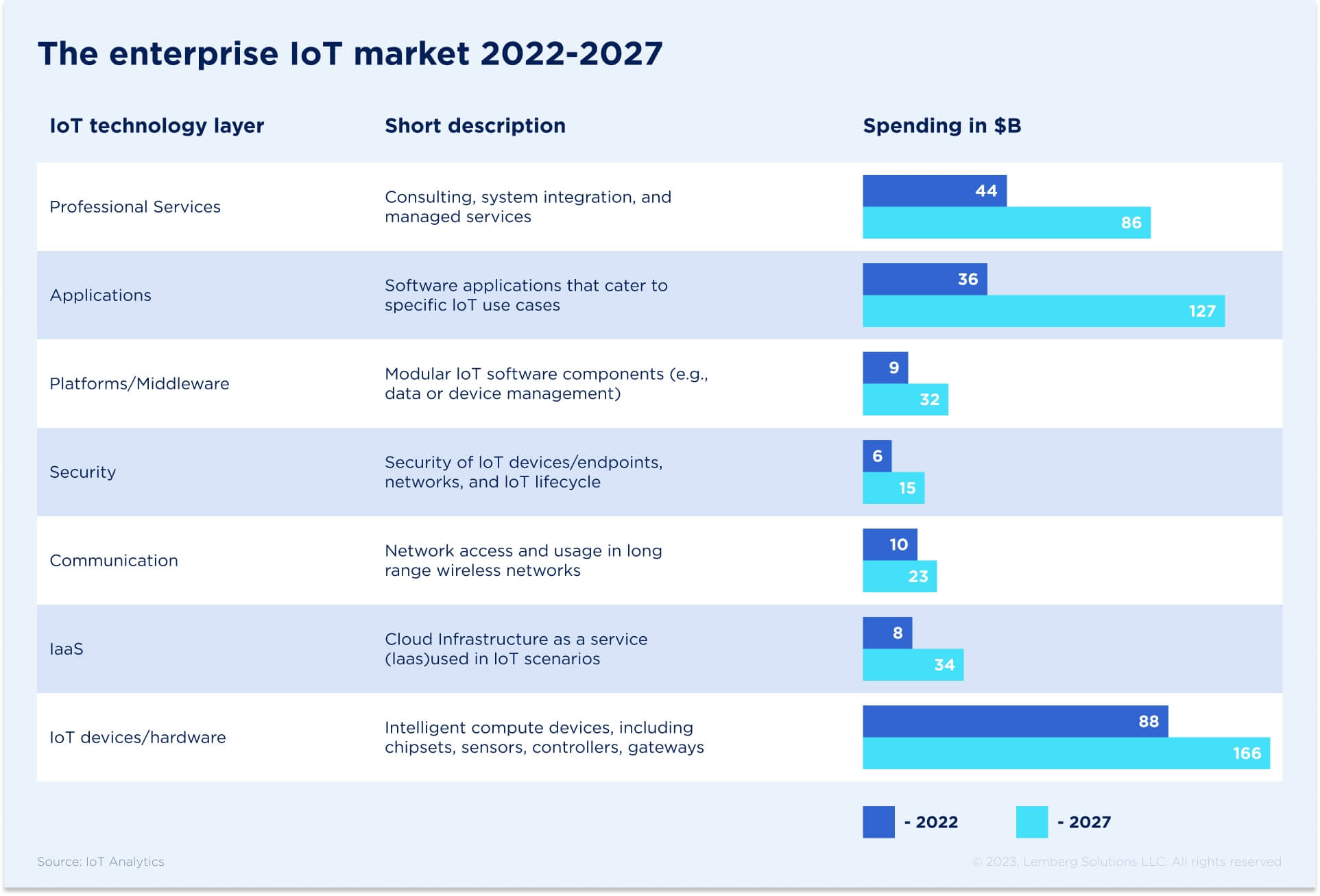
As of 2022, several tech leaders contributed to IoT development by introducing new products or product improvements. Amazon launched AWS IoT FleetWise service for the logistics industry. Their new solution allows fleet management companies to collect and transfer vehicle data in real time. Siemens introduced an open digital business platform, Siemens Xcelerator, that enables faster digitalization with the help of IoT solutions. PTC launched the ThingWorx 9.0 platform version that enhances IoT development and provides new features for scaling and customizing IoT solutions. Cisco improved its IoT Control platform, which is now more convenient for low-power and cost-efficient devices.

We expect even more innovations and IoT software solutions in the forthcoming years that will shape the future of enterprise IoT.
4 Benefits of enterprise IoT
More and more businesses aim to adopt connectivity practices and integrate enterprise IoT into company operations for several reasons. Here are the core advantages of enterprise IoT:
1. Cost-effectiveness
Enterprise IoT helps businesses find the areas where they can reduce budget expenditures. For instance, if a company's equipment frequently malfunctions, they can apply enterprise IoT technologies to find what causes the downtime and how to detect the problem at an early stage. Additionally, with the help of IoT solutions for enterprises, businesses can cut power usage and save on bills.
2. Improved safety
Incorporating enterprise IoT solutions, manufacturing and construction enterprises enhance safety measures by introducing collision-avoidance services to mitigate accidents at their worksites. Likewise, automotive manufacturers integrate connectivity features into their products, enabling cars to alert drivers about necessary firmware updates and maintenance requirements. Medical device manufacturers implement innovative healthcare services by leveraging IoT products to meet the evolving needs of patients and medical practitioners.
3. Workflow automation
Enterprise IoT allows delegating time-consuming manual work to automated devices. Instead of gathering system output and inputting the data manually, workers can use IoT software to process the needed information. For example, IoT systems can evaluate equipment performance and provide the workers with estimation results.
4. Efficient operation management
Enterprise IoT allows you to manage several operations simultaneously through connecting devices. This way, organizations gain better and more organized control of warehouse, shipping, and equipment management. They also benefit from effective automation and downtime decrease, which leads to cost and management optimization.
Enterprise IoT use cases
Numerous industries benefit from enterprise IoT systems, including healthcare, retail, manufacturing, and logistics. Check out IoT enterprise use cases to learn how smart devices help different companies improve their business operations.
Healthcare

The healthcare industry actively uses enterprise IoT to ensure patient safety and effective staff management all over the hospital. Such a huge system requires stable connectivity and reliable real-time data analysis. Enterprise IoT allows healthcare providers to manage numerous medical equipment items and monitor healthcare professionals' workloads. As a result, hospitals ensure even load distribution and timely patient care. Smart devices notify medical workers if a patient requires immediate help, assist patients in scheduling appointments and medicine intake, as well as track equipment performance.
Lemberg Solutions helped the healthcare industry client to create an enterprise IoT device that aims to improve healthcare delivery in German hospitals. We developed an electronic nurse medical tablet prototype designed to measure patients' vital signs (temperature, blood pressure, heart rate, oxygen level, and respiratory rate) and automatically generate a therapy and meal plan. Users can already use a prototype with voice control. Read more about the development process.
Retail
Shopping experiences directly affect the success of retail businesses. To ensure better service quality and retail management, companies leverage enterprise IoT systems. Smart devices empowered with ML algorithms help to track product turnover. You can find out what items are more popular and when to replenish the stock to deliver in time. Enterprise Internet of Things solutions also enable theft prevention through computer vision systems detecting criminal behavior and reporting to the managers. Besides, you can estimate wait time and reduce it to increase customer satisfaction rate. Smart devices enable inventory management and monitoring, which leads to improved business efficiency.
Our embedded engineering team worked on an IoT web app that enables cargo tracking during transportation and within a warehouse in real time. Additionally, the asset tracking system provides detailed information on the storage conditions. As a result, end users can easily manage their shipments and be aware of the actual transportation conditions. Get more information about the project.
Manufacturing

Manufacturing companies leverage IoT technology to track production flow and estimate material quantity to reduce waste. Workers can delegate equipment performance monitoring to smart sensors. They will receive notifications based on real-time analysis and prevent machinery failure. As a result, businesses will reduce the costs and time they spend on fixing the damage by preventing it. With the help of enterprise IoT platform, you will also detect and avert safety hazards. IoT sensors will notify the workers if any equipment failure occurs or if working conditions aren’t safe.
One of the most crucial safety conditions that should be controlled on the manufacturing site is temperature. Our engineers helped the client to create a BLE-enabled industrial thermostat that can be configured and controlled via mobile apps. The goal was to turn a manual thermostat into a wireless-controlled IoT device. We integrated a BLE module into the thermostat PCB and developed mobile apps for iOS and Android. Read a detailed case study.
Transportation and logistics

With an effective IoT system, you can track your shipments and fleet and make informed business decisions in case of any delays or deviations from shipment route. You can also monitor compliance with safety protocols and adherence to safety procedures, which reduce safety violations and mitigate the risk of accidents. A transportation IoT solution enables tracking driver behavior and shipment conditions.
For instance, you can place specific sensors in trucks that will notify drivers about temperature and pressure changes. This way, drivers can timely fix any malfunctions to take care of asset quality. Additionally, businesses can monitor storage conditions and track asset movement within warehouses.
In one of our projects, the Lemberg Solutions team helped the client to develop an enterprise IoT fleet management platform for transportation and logistics. Our engineers designed and delivered the first system prototype. After securing the necessary funding with the help of this prototype, our client requested a larger dedicated team to participate in their ongoing software development process. The product has already been certified on the Canadian market, and we hope to help our client grow their business even further. Learn more about the development process in the case study.
Enterprise IoT trends
To ensure competitive advantage, businesses need to stay up-to-date when it comes to enterprise IoT trends. We will review the most popular tendencies to help you get enterprise IoT insights and improve your company's operations through innovations.
5G
The success of IoT systems lies in stable connectivity. 5G networks have gained popularity since they ensure fast and reliable connection and communication between smart devices. This technology boosts real-time analysis and ensures informed decision-making. 5G offers low latency, high bandwidth, and scalable mesh networking.
Edge computing
Edge computing allows you to speed up data analytics, which results in higher business productivity. Data transmission to edge devices accelerates communication between smart devices and decreases latency. Businesses receive faster outputs and can make important decisions quicker.
Cross-platform interoperability
Cross-platform interoperability enables seamless communication between IoT devices regardless of their manufacturer and hardware characteristics. With a growing number of smart devices, cross-platform interoperability is a go-to for business owners. They can create a unified ecosystem where different third-party devices can transmit data, enabling more efficient and effective IoT deployments.
Sustainable IoT
Sustainable IoT promotes environmental sustainability and addresses environmental challenges to introduce eco-friendly practices. Sustainability in enterprise IoT means using energy-efficient and waste management technologies to reduce environmental harm. Smart devices consume minimal power during their operation, ensuring reduced impact on overall energy consumption. This leads to smart resource management among different businesses.
Artificial intelligence
According to market research, almost half of enterprises will integrate ML algorithms into their IoT solutions by 2027. Computer vision technologies gain more popularity since they are helpful in numerous industries, including healthcare, automotive, and retail. Businesses will use them for security, asset monitoring, and workplace safety through computer vision systems and IoT sensors.
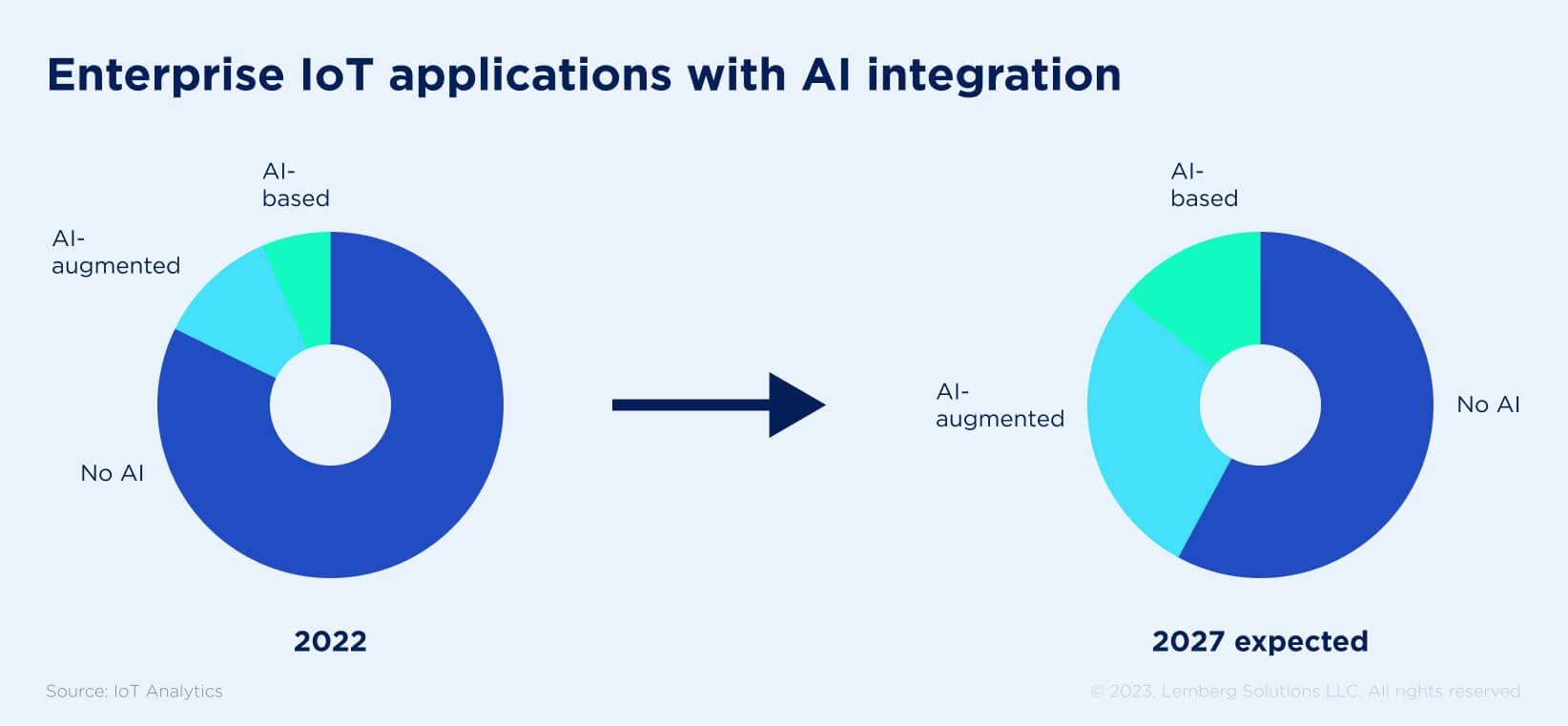
Enterprise IoT challenges to be ready for
Every technology implementation comes with a set of challenges you need to consider before integrating it. Here are the most common enterprise IoT challenges organizations face:
Data security
Smart devices collect and transmit sensitive data, which makes them vulnerable to cyberattacks and data breaches. Ensuring security for these devices is critical since businesses need to protect user privacy and their internal data. What to do about it? You can ensure enterprise IoT security by complying with data protection regulations and undergoing specific audits to check the company's weak points. Besides, it’s always advisable to collaborate with software development providers that have ISO/IEC 27001:2013 and ISO 9001:2015 certifications.
5G demands
IoT devices work with data analysis and generate vast amounts of information. Extracting valuable insights from this data and turning it into useful information requires stable mesh network performance. However, such networks require embedded engineers to create IoT solution that is self-healing and self-configuring.
Latency
Real-time data analysis can only be possible if the latency is extremely low. Organizations aiming to adopt IoT for enterprises need to choose reliable data platforms for enterprise IoT that provide real-time data analysis services.
Addressing these challenges requires a comprehensive approach and a reliable tech partner. Through thorough planning and risk assessment, you can overcome these challenges and unlock the full potential of IoT in the enterprise environment.
How we can help with enterprise IoT
You can leverage our enterprise IoT services to create a reliable system to make your business more efficient, productive, and sustainable. Our team of skilled software developers specializes in embedded system development and offers seamless integration services with various cloud platforms, including AWS, Microsoft Azure, Google Cloud, or custom cloud solutions. We implement reliable IoT communication protocols like MQTT and REST API, ensuring secure connections for authorized devices. This allows for efficient device data collection, storage, and analysis of device data, along with remote device management and firmware updates.
We can increase the intelligence of your devices by integrating AI into your IoT system. Our data science experts can design ML models to run directly on your IoT device, enabling effective edge processing.

Takeaway
Even though enterprise IoT poses challenges like data security, mesh network demands, and latency, this technology is the future of large businesses. Companies choose it for cost-effectiveness, workflow automation, and efficient management. Enterprise IoT allows organizations to increase productivity and maintain fail-safe practices for equipment use. The technology helps to create safe workplace environments as well as assists employees in day-to-day decision-making. Enterprise IoT is successfully leveraged in the healthcare, retail, manufacturing, and logistics industries, to name a few. Smart devices help monitor patients, balance workloads for employees, track shipments, assist truck drivers, and manage assets within warehouses.
At Lemberg Solutions, we can assist you with enterprise IoT requirement elicitation, design, development, launch, and maintenance. Start with consulting to learn how we work and what services you will need for IoT implementation.


